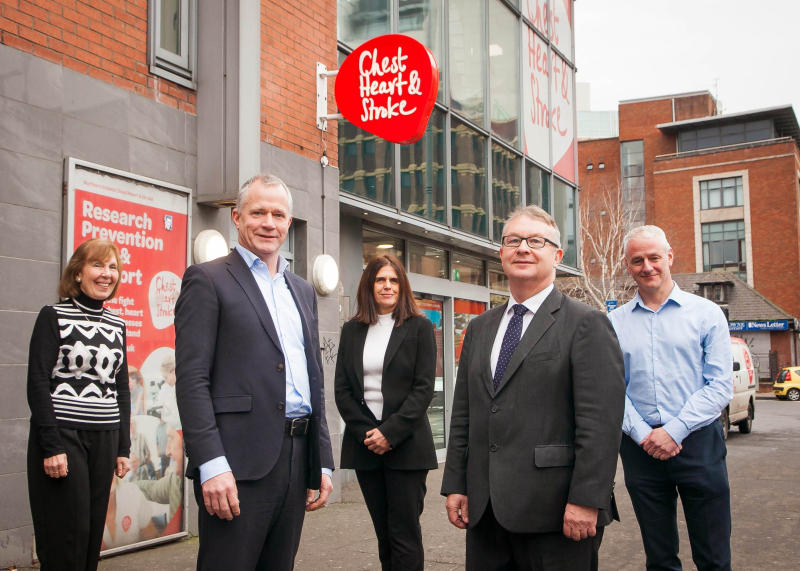Investing in high-quality, ground-breaking local research is at the heart of Northern Ireland Chest Heart & Stroke (NICHS). Since the first grant in 1958 (£35 to Dr Knox to research Chronic Bronchitis), they have devoted themselves to funding treatments, medications, therapies, rehabilitation programmes and cures.
NICHS has invested almost £9 million into research in local universities and hospitals since 1994, which has advanced the prevention, treatment and care of chest, heart and stroke conditions within Northern Ireland. Fidelma Carter, Head of Public Health at the charity explains; “A key priority for NICHS is ensuring fewer people develop chest, heart and stroke related illnesses and that more people than ever survive them with an enhanced quality of life and greater independence. Research is vital to this.”
“Over the past 29 years we have supported local research by investing millions of pounds and funding a total of 117 projects. We currently have 23 projects live, with a total of £1,902,292 currently invested in research, all funded through the kind donations received from the public, partners and donors, for which we are extremely grateful.”
“One exciting research project is looking at a potential new test for Atrial Fibrillation. Atrial Fibrillation, or AF, is a heart condition that causes an irregular and often abnormally fast heart rate. Over 39,000 people in Northern Ireland are living with Atrial Fibrillation and a further 10,000 may be undiagnosed¹ ². AF can increase a person’s stroke risk by up to five times if untreated and the stroke is more likely to be severe.”
Fidelma continues; “Dr Claire Tonry and a team from Queen’s University Belfast are looking for new blood-based biomarkers to help detect AF. Risk for AF is currently determined based on various clinical and lifestyle risk factors, such as age, sex and underlying vascular conditions. However, not all people with AF will have these risk factors. There are proteins in the blood that can be used to detect heart damage, but these are not specific to AF. AF can be quite a ‘silent’ condition so the team are aiming to develop a test that can be used routinely to measure subtle changes in the blood before patients become very symptomatic of AF. In people already diagnosed with AF, they want to see if there are biomarkers in their blood which indicate if they are at an increased risk of a future stroke or heart failure.”
“Knowing about and being able to test for these new biomarkers could facilitate earlier AF diagnosis and intervention with treatment plans by clinicians. For people with AF, easier routine monitoring could help reduce their risk of having a stroke which is important as an AF related stroke has very poor outcomes. Overall, the findings from this research could really help improve patient prognosis and quality of life, so we are excited to see how this project develops.”
Every year, NICHS invites researchers from local universities and hospitals to apply to their Scientific Research Grants programme. Through this programme successful applicants are funded to carry out high-quality research that delivers real benefits to people living with chest, heart, and stroke conditions.
The Scientific Research Committee at NICHS meets this week to review applications. It is chaired by Professor Martin McKee, CBE, who says; “I’m delighted to be chairing the 2023 Scientific Research Committee. This is my second year as Chair and it’s a privilege to work with Northern Ireland Chest Heart & Stroke. I had long admired the work of the charity but, now that I’ve seen at close hand what they do, I’m even more impressed. The quality of the research they support here in Northern Ireland is outstanding and is making a real difference to our ability to save lives here and further afield.”
“We’ve seen tremendous improvements in the health of the people of Northern Ireland since I started work as a junior doctor in the Belfast City Hospital in 1979 and much of that is due to advances in research. But there is so much more that we can do. We’ve all been focused intensely on the COVID pandemic for the past few years, and this is entirely appropriate. But we must not forget that there are other threats to health and the research that Northern Ireland Chest Heart & Stroke supports is making a major contribution to tackling some of the greatest killers.”
“Last year the Scientific Research Grants programme attracted such incredible applications the decision was made to increase the NICHS research funding budget by 63%, from £400,000 to £638,522. We look forward to reviewing this year’s applications and announcing some exciting new research projects soon.”
Find out more about Northern Ireland Chest Heart & Stroke research projects, past and present, at www.nichs.org.uk/research

Professor Margaret Cupples; Declan Cunnane; Fidelma Carter; Professor Martin McKee; Dr Dara O’Donoghue.
